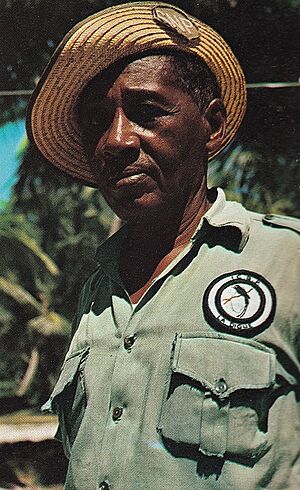BirdLife International facts for kids
 |
|
| Formation | June 20, 1922 |
|---|---|
| Type | INGO |
| Purpose | Conservation |
| Headquarters | |
|
Region served
|
Worldwide |
|
Chairman
|
Dr Mike Rands |
|
CEO
|
Martin Harper |
|
Formerly called
|
International Council for Bird Preservation |
BirdLife International is a worldwide group of organizations working together to protect birds and their homes, called habitats. It's like a big team of people who care deeply about nature. Their main goals are to stop bird species from disappearing forever, find and protect important places where birds live, help keep bird habitats healthy, and support people around the world who work to save nature.
This organization has over 2.5 million members. These members are part of 116 partner groups in different countries. Some well-known partners include the Royal Society for the Protection of Birds in the UK and the National Audubon Society in the USA.
BirdLife International has found 13,000 special places called Important Bird and Biodiversity Areas. These are key spots for birds. They also help decide which bird species are at risk of extinction for the International Union for Conservation of Nature's IUCN Red List. As of 2015, BirdLife International reported that 1,375 bird species were in danger of extinction. This means about 13% of all bird species needed urgent help.
BirdLife International also publishes a magazine called BirdLife: The Magazine. It comes out four times a year and shares the latest news and interesting articles about birds and how to protect them. They also have an official science journal called Bird Conservation International.
History of BirdLife International
BirdLife International started a long time ago, in 1922. It was first called the International Council for Bird Protection. Two American bird experts, T. Gilbert Pearson and Jean Theodore Delacour, helped create it.
Over the years, the group changed its name a few times. In 1928, it became the International Committee for Bird Preservation. Then, in 1960, it was known as the International Council for Bird Preservation. Finally, in 1993, it got its current name, BirdLife International.
How BirdLife International Protects Birds Globally
BirdLife International runs nine major conservation programs. These programs are active all over the world, including in Africa, the Americas, Asia, Europe, the Middle East, and the Pacific. These programs help plan, carry out, and check their work to protect birds.
Some of their important programs include:
- The Important Bird and Biodiversity Areas Program, which focuses on protecting key bird habitats.
- The Marine Program, which works to save seabirds and their ocean homes.
- The Preventing Extinctions Program, which directly helps species that are close to disappearing.
- The Flyways Program, which protects the long routes birds use when they migrate between different parts of the world.


